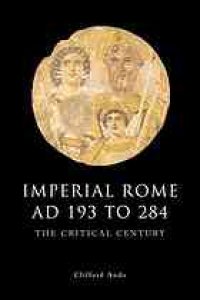
Ebook: Imperial Rome AD 193 to 284 : the critical century
Author: Ando Clifford
- Tags: Rome -- History -- Empire 30 B.C.-284 A.D. Rome -- Politics and government -- 30 B.C.-284 A.D. Rome -- Economic conditions -- 30 B.C.-476 A.D. Economic history. Politics and government Rome (Empire) Römisches Reich
- Series: Edinburgh history of ancient Rome
- Year: 2012
- Publisher: Edinburgh University Press
- City: Edinburgh, Rome, Römisches Reich, Rome (Empire)
- Language: English
- pdf
"The Roman empire during the period framed by the accession of Septimus Severus in AD 193 and the rise of Diocletian in 284 has conventionally been regarded as one of crisis. Between 235 and 284, at least eighteen men held the throne of the empire, for an average of less than three years, a reckoning that does not take into account all the relatives and lieutenants with whom those men shared power. Compared to the Read more...
Abstract: "The Roman empire during the period framed by the accession of Septimus Severus in AD 193 and the rise of Diocletian in 284 has conventionally been regarded as one of crisis. Between 235 and 284, at least eighteen men held the throne of the empire, for an average of less than three years, a reckoning that does not take into account all the relatives and lieutenants with whom those men shared power. Compared to the century between the accession of Nerva and the death of Commodus, this is a period of striking volatility. The middle of the century also witnessed catastrophic, if temporary, ruptures in the territorial integrity of the empire. Large portions of the eastern and western halves of the empire passed under the control of powers and principalities who assumed the mantle of Roman government and exercised meaningful and legitimate power over millions. Even those regions that remained Roman were subjected to deprivation and pillage by invading armies. The Roman peace, which had become in the last instance the justification for empire, had been shattered. Clifford Ando describes and integrates the contrasting histories of different parts of the empire and assesses the impacts of administrative, political and religious change." - Back Cover